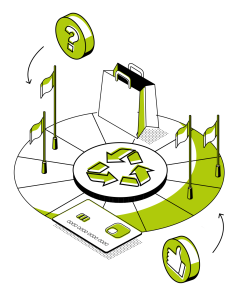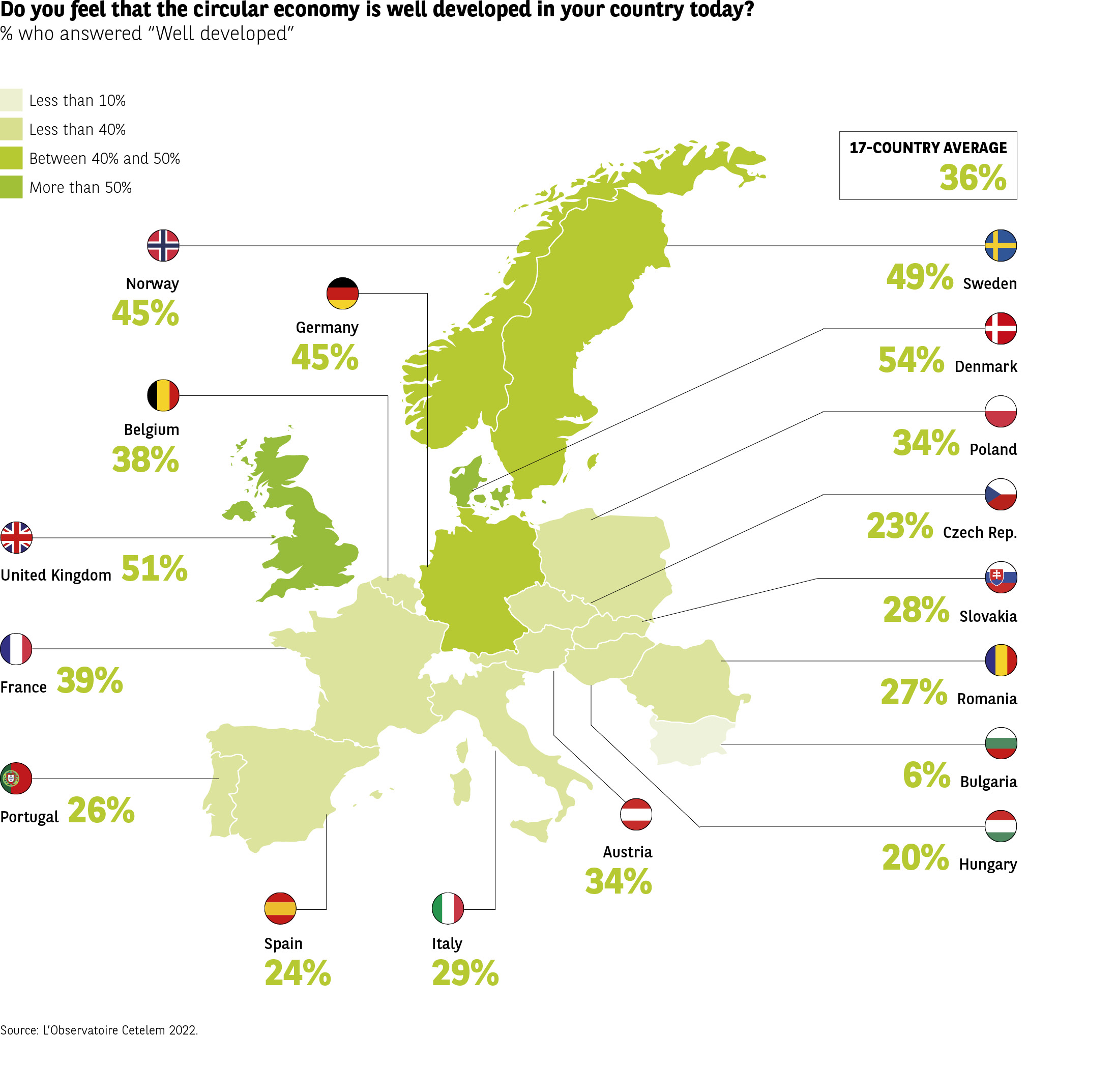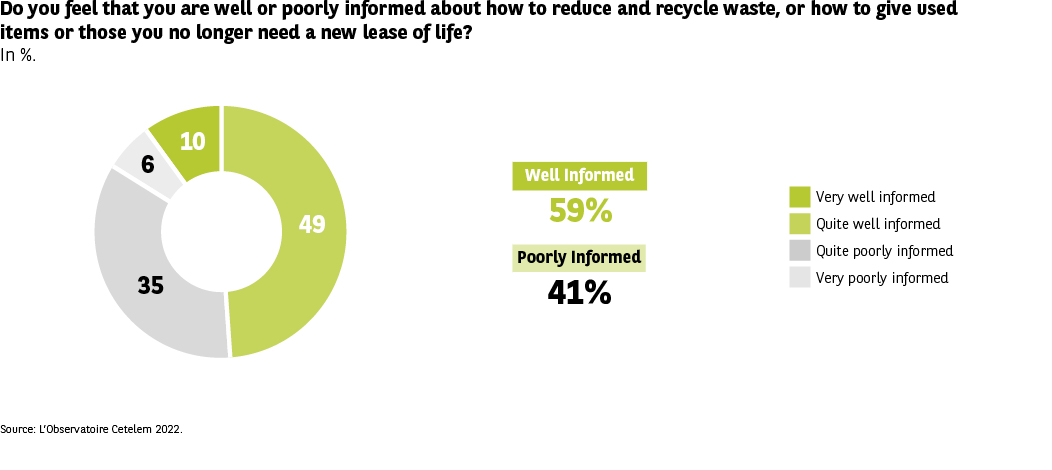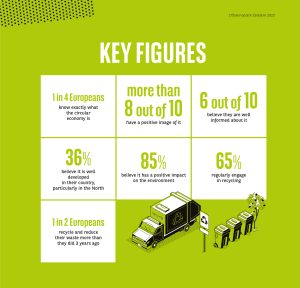A growing prominence


North and South: poles apart

A quarter of Europeans claim to know what the term circular economy means. An even greater number believe it is well developed in their country, underlining the fact that it is evolving in a positive and beneficial way, just like the practices it encompasses (Fig. 6).
Fig. 6 Perception of Circular Economy Development
Download this infographic for your presentations The infographic presents the percentages of people who claim that the circular economy is developed in their country.
Unit: % of “Developed” responses.
Map colors: • <10%, • 10-40%, • 40-50%, • 50%. These colors are informative and not decorative.
Source: Cetelem Observatory 2022.
Key Visual Elements
A map of Europe displays colors according to the perceived level of development, with numerical values associated with each country.
Data Transcription
• Denmark: 54%
• Sweden: 49%
• United Kingdom: 51%
• Norway: 45%
• Germany: 45%
• France: 39%
• Belgium: 38%
• Italy: 29%
• Spain: 24%
• Portugal: 26%
• Austria: 34%
• Poland: 34%
• Czech Republic: 23%
• Slovakia: 28%
• Romania: 27%
• Hungary: 20%
• Bulgaria: 6%
Average of 17 countries: displayed separately (value not shown in the image).
Main Finding
Northern European countries have the highest perceived levels, while a majority of Central and Southern European countries report lower levels.
The infographic presents the percentages of people who claim that the circular economy is developed in their country.
Unit: % of “Developed” responses.
Map colors: • <10%, • 10-40%, • 40-50%, • 50%. These colors are informative and not decorative.
Source: Cetelem Observatory 2022.
Key Visual Elements
A map of Europe displays colors according to the perceived level of development, with numerical values associated with each country.
Data Transcription
• Denmark: 54%
• Sweden: 49%
• United Kingdom: 51%
• Norway: 45%
• Germany: 45%
• France: 39%
• Belgium: 38%
• Italy: 29%
• Spain: 24%
• Portugal: 26%
• Austria: 34%
• Poland: 34%
• Czech Republic: 23%
• Slovakia: 28%
• Romania: 27%
• Hungary: 20%
• Bulgaria: 6%
Average of 17 countries: displayed separately (value not shown in the image).
Main Finding
Northern European countries have the highest perceived levels, while a majority of Central and Southern European countries report lower levels.
And while 36% of Europeans on average are of this view, the figure does not reflect the significant geographical disparities at play, with many countries finding themselves at opposite ends of the spectrum. In the countries of the North is where we find those who are quickest to assert that their circular economy is well developed, not least the UK and Norway, where 1 in 2 respondents express this opinion. Respondents in the South are less likely to do so, with the Bulgarians proving to be particularly sceptical (6%).
France finds itself somewhere in between, with a near-average score.
Consumers are well informed
The level of awareness shown by European consumers regarding the circular economy is a source of even greater hope for its development in the coming years. 6 out of 10 believe they are well informed or very well informed on the topic (Fig. 7). The three Nordic countries stand out as being clearly the most knowledgeable (7 out of 10). The Eastern European countries also form a fairly homogeneous group, but one that displays much less awareness, with the Bulgarians emerging as the least well informed Europeans (only just under 4 out of 10). More surprisingly, several Western European nations score below the overall average. They notably include Austria and France (1 in 2).
Fig. 7 Perception of Information Level
Download this infographic for your presentations The question asked is: “Do you feel well or poorly informed about how to reduce waste, recycle, or give a second life to objects?” Unit: %. Circular diagram with informative colors (4 levels of information). Source: Cetelem Observatory 2022.
Key Visual Elements
A segmented ring indicates four levels of information. A text summary at the bottom indicates: • Well-informed: 59% • Poorly informed: 41%
Data Transcription
Diagram segments: • 49% Very well-informed • 35% Fairly well-informed • 10% Fairly poorly informed • 6% Very poorly informed
Main Finding
A majority claims to be well or very well-informed on these topics, although a significant proportion expresses a lack of information.
The question asked is: “Do you feel well or poorly informed about how to reduce waste, recycle, or give a second life to objects?” Unit: %. Circular diagram with informative colors (4 levels of information). Source: Cetelem Observatory 2022.
Key Visual Elements
A segmented ring indicates four levels of information. A text summary at the bottom indicates: • Well-informed: 59% • Poorly informed: 41%
Data Transcription
Diagram segments: • 49% Very well-informed • 35% Fairly well-informed • 10% Fairly poorly informed • 6% Very poorly informed
Main Finding
A majority claims to be well or very well-informed on these topics, although a significant proportion expresses a lack of information.

